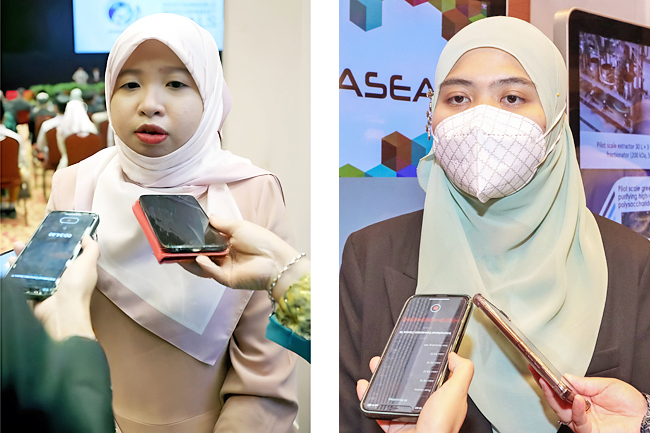Izah Azahari
Winning the Crown Prince Creative, Innovative Product and Technological Advancement (CIPTA) Award is an exceptional and highly sought-after accomplishment for Bruneians, especially with its rigorous selection process and criteria.
The Crown Prince CIPTA Award recognises and celebrates outstanding creative and innovative contributions in product development and technological advancements.
The award signifies that the recipient’s work has surpassed stringent evaluation standards and has been acknowledged as exemplary by a distinguished panel of experts. It serves as a testament to the remarkable talent and ingenuity within the Sultanate.
Although this year’s awarding event did not see any entries winning the coveted Crown Prince CIPTA Award 2023 trophy, there were notable winners from the local categories.
One was ‘A Sustainable and Immersive Experience of Simulation Training Platform in Agriculture Using Extended Reality (XR) Technology’ by Sarinah binti Ziziumiza and Nursheila binti Ziziumiza from Rumine Corporation that won second place in the local category\.
Sarinah spoke to the Bulletin on the innovative virtual learning tool designed for farmers and agriculture industry trainees.


Sarinah explained that the simulation harnesses the power of virtual reality (VR), augmented reality (AR), and hand motion sensors to create an immersive training experience.
The tool boasts several key features enhancing the user experience. It offers a panoramic 360-degree view from a first-person perspective, providing users with an immersive environment. Users can interact with buttons and elements within the simulation, and even engage with simulation models using natural gestures and movements.
The project aims to construct a virtual environment replicating real-world agricultural settings to ensure that users can acquire practical knowledge and skills in a realistic and immersive context.
Meanwhile, enabling users to directly engage with physical models and manipulate virtual objects enhances the learning experience and promotes hands-on practice. As users can practice freely, improvement of cognitive skills and motor abilities can be facilitated until they reach a level of competence.
The simulation addresses several challenges faced by farmers. It reduces the equipment and resource cost for training by providing a cost-effective virtual alternative. Secondly, it significantly shortens training times as individuals can study and practice independently, aided by tutorials within the application. Additionally, trainers can use the simulation to evaluate trainees’, gaining insights into their progress and areas for improvement.
Finally, the use of a VR system helps to mitigate hazards and risks associated with traditional training methods.
Another winning entry was ‘Mamoru: Accident Prevention Motorcycle Helmet’ by Muhammad Iman Danial bin Haji Awang and Danial Batrish Moksin bin Abdullah from Berakas Secondary School and supervising teacher Pengiran Abdul Raub bin Pengiran Haji Ghani that placed third in the smart junior category.
Another supervising teacher Nurul Faizah binti Ya’akub said that in a bid to address the pressing issues of Sustainable Development Goals (SDGs) and the prevalent concerns affecting Asia, the students embarked on a project focussing on a critical topic: “How to prevent accidents on motorcycles?”
Recognising the inherent dangers of motorcycles compared to cars, the students delved into exploring effective measures to mitigate accidents and promote safety.
The endeavour, known as the Smart Junior project, began with extensive research and analysis.
The students devoted at least two months to crafting a plan. Once the plan was developed, they presented it to their teachers for feedback.
Through this iterative process, the ideas were refined to ensure realism, affordability, and alignment with the SDGs.
The outcome of their efforts was a comprehensive plan for an innovative helmet designed to prevent accidents on motorcycles. While still in the conceptual stage, the helmet incorporates various sensors to enhance safety measures.
One sensor focusses on eye movements, detecting signs of drowsiness and preventing riders from falling asleep. Another monitors sudden head movements, such as when a rider nods off, and triggers an alert to wake them up.
As the project aligns with the SDGs and takes place in Brunei, the students have considered utilising the abundant sunlight available in the region to enhance their design.
Exploring ways to integrate solar-powered components or technologies may present an additional avenue for improving the effectiveness of the safety measures.
Nurul Faizah said that although the students acknowledge that this solution is not fool proof, it represents a significant step towards accident prevention.
The project’s future lies in the students’ choices and commitments. Presently, they are preparing for mid-year exams, and their intentions beyond that period remain to be seen.
However, the teachers involved express their willingness to support the students should they decide to continue working on the project.
With their support and encouragement, these young innovators have the potential to make a real impact on motorcycle safety in Brunei and beyond.




